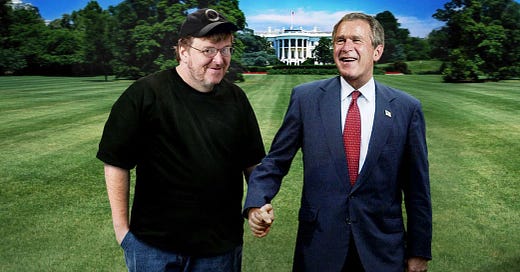Michael Moore's 'Fahrenheit 9/11' Looks Tame But Still Amuses 20 Years Later
The 2004 Palme d'Or winner and box office giant was essential viewing at the time, but is there any reason to watch it today?
In May 2004, the Cannes Film Festival welcomed its second Michael Moore film into the main competition. This time, Moore won, as Fahrenheit 9/11 became the rare documentary to receive the festival’s prestigious top honor. Only once before and never again was a nonfiction feature awarded the Palme d’Or. The next month, the film opened in the U.S. to record-breaking numbers, ultimately grossing more than $119 million domestically (that would be $206 million at today’s ticket prices), despite being heavily pirated. Worldwide, Fahrenheit 9/11 took in twice as much. While it won several end-of-year critics group awards, including the Critics Choice, the film wound up being ineligible for the Oscar for Best Documentary Feature due to a distribution choice that wouldn’t disqualify it today.
In the 20 years since its premiere, the once-high-stakes Fahrenheit 9/11 has understandably lost much of its appeal and purpose. The film arrived in a U.S. presidential election year, as many political documentaries do, and had little impact on the race even though tens of millions of voters paid to watch its criticisms and mockery of George W. Bush on the big screen. The president retained the White House for another four years, and the Iraq War continued for seven more years, officially concluding in 2011. Osama bin Laden was also found and killed that year. The rhetoric and evidence shared in Fahrenheit 9/11 were still potent, as thousands more Americans had been killed in Iraq by then. Some of the film’s bits, however, were dated as early as Fahrenheit 9/11’s home video release date — most notably the segment about children of congressmen not serving in Iraq.
In 2014, when Sight & Sound conducted a poll to determine the best documentaries of all time, Fahrenheit 9/11 tied for 98th place and 88th place in the results based on critics’ and filmmakers’ votes, respectively. Only four critics, including Peter Bradshaw and John Corner (who recognized it as being “irritating in parts”), named it among their picks, and only two filmmakers: Peter Davis and Gordon Quinn. Interestingly enough, Davis also named three other Moore films, Bowling for Columbine, Roger & Me, and Sicko, the last of which only received that one vote. In his comments, he admitted to being “prejudiced in favor of Michael Moore.” Would Fahrenheit 9/11 still be mentioned by anyone in a follow-up poll another decade later? Is there any reason why it should be?
Aside from the fact that Fahrenheit 9/11 feels timely in spots — contested election results and an attempt to block the transfer of power, an awful terrorist attack followed by questionable military action in a formerly British-occupied Middle Eastern nation, U.S. leaders using their position in the White House for financial gain, etc. — the content of the film is light by today’s standards in terms of the quantity and substance of the information. We’ve since seen plenty of documentaries that dive deeper into the conspiracies and intricacies of 9/11 and the Iraq War or that took both events more seriously and were, therefore, more valuable at the time and are now still. Even as far as its historical worth goes, Fahrenheit 9/11 is a relic of an era when too many people leaned on comedic entertainment for their political discourse.
Still, although much of the documentary consists of amusing bits, including a few that could have been mistaken for The Daily Show segments from the time, and Michael Moore’s narration is riddled with jokes, Fahrenheit 9/11 has a rather somber tone overall. A lot of that jokey narration is coupled with a melancholy piano score. Moore’s climactic focus is on a mourning mother whose son was killed in Iraq, and while it could be seen as exploitative, the sequence never plays that way. It’s miles further in maturity from the cheap Charlton Heston stunt of Moore’s otherwise impeccable previous feature, Bowling for Columbine. Speaking of that film, it’s interesting to look back at Fahrenheit 9/11 now as a sort of continuation of Bowling for Columbine given the way that both use the events of 9/11 as part of their arguments.
I admit that I had forgotten how little Fahrenheit 9/11 is about September 11th despite the title. Moore doesn’t even show the planes flying into the Twin Towers this time, opting instead for audio clips of the attack and a montage of reaction shots. The film is primarily about the Iraq War — which Moore had already stated was being fought for “fictitious reasons” at the Oscars a year earlier— as an unnecessary and unjustified reaction to 9/11. More broadly, the documentary is about the military-industrial complex and how fear fuels and aids that industry. So much of Fahrenheit 9/11 is made up of tips of icebergs, though. It’s not a place to go to for detailed facts or considerable analysis. Almost all of its evidence is circumstantial as it aims to make connections in our minds without offering concrete proof. If Moore wasn’t so interested in humor and entertainment value and treated all of this more sincerely, it would come across as the ramblings of a conspiracy theorist.
Keep reading with a 7-day free trial
Subscribe to Nonfics to keep reading this post and get 7 days of free access to the full post archives.





